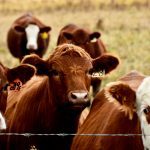1.
Tag Archives greenhouse gases

Study indicates methane emissions from dairy farms higher than previously thought
To reach net zero by 2050, the UK must reduce greenhouse gas emissions from agriculture and methane emissions from farm livestock pose a thorny problem. Ruminants such as cattle and sheep emit […] Read more

Food companies launch partnership to cut dairy industry’s CO2 emissions
Food companies Ajinomoto and Danone unveiled on Thursday a partnership to reduce the dairy industry's greenhouse gas emissions using a feed additive called AjiPro®-L, which is purported to reduce nitrous oxide emissions from manure.

Atlantic ag emissions dropped slightly since 1990: report
Greenhouse gases from cattle, fuel oil dropped; nitrogen, diesel fuel emissions increased
Atlantic Canada's net agricultural emissions have fallen slightly between 1990 and 2021 as livestock numbers decreased and reliance on fuel oil declined, a new report says.

Farmers demand incentives for environmental changes
A recent consultation hears that the federal government’s proposed Sustainable Agriculture Strategy must make economic sense
Glacier FarmMedia – A federal environmental strategy for the agriculture sector should be viewed through an economic lens, says a report from consultations on the proposed Sustainable Agriculture Strategy. It […] Read more

Government looks for ways to cut cattle’s methane emissions
Ottawa announces Agricultural Methane Reduction Challenge
Glacier FarmMedia – Ottawa is making $12 million available to help find ways to reduce methane emissions from cow-calf, dairy and feedlot operations. The Agricultural Methane Reduction Challenge is part […] Read more

Researchers examine role of soil microbes in GHG emissions
Guelph study compares coniferous, deciduous and grass riparian buffer zones
Researchers at the University of Guelph are studying how best management practices on farms affect soil microbial communities and greenhouse gas emissions. Kari Dunfield, professor and Canada Research Chair in […] Read more

Another way to look at environmental metrics
Protein density and ecosystem impacts make meat competitive with grains, say researchers
When attempting to get an accurate gauge of global food security and protein sufficiency, metrics matter. The food sufficiency metric must reflect what each type of food production supplies, including […] Read more

Trudeau assures farmers fertilizer emissions target is voluntary
All leaders of major parties addressed farmers at the Canadian Federation of Agriculture annual meeting for the first time in memory
Glacier FarmMedia – Prime minister Justin Trudeau reiterated at the recent Canadian Federation of Agriculture (CFA) annual meeting that the fertilizer emissions reduction target proposed by his government is voluntary. […] Read more

How to expand production and slash emissions
A recent report concludes that carbon sequestration is the key to producing more crops while reducing greenhouse gases
Glacier FarmMedia – Canadian farmers can play an even greater role in the global food powerhouse while reducing overall greenhouse gas emissions, a team of economists and analysts argues in […] Read more

Opinion: Cows, oil and elephants
Livestock’s contribution to greenhouse gas emissions needs to be put into context
More than 30,000 people met recently in Egypt for the 27th United Nations Conference of the Parties (COP27) to deal with what many consider to be the single biggest challenge […] Read more


